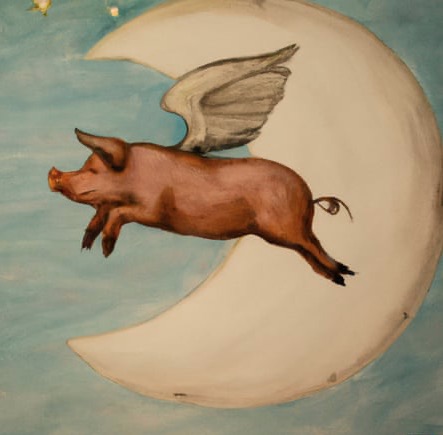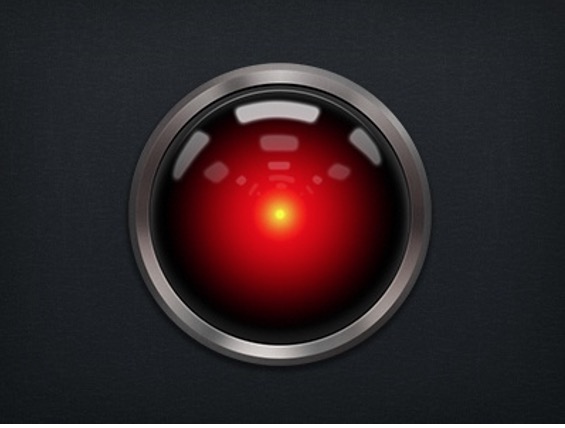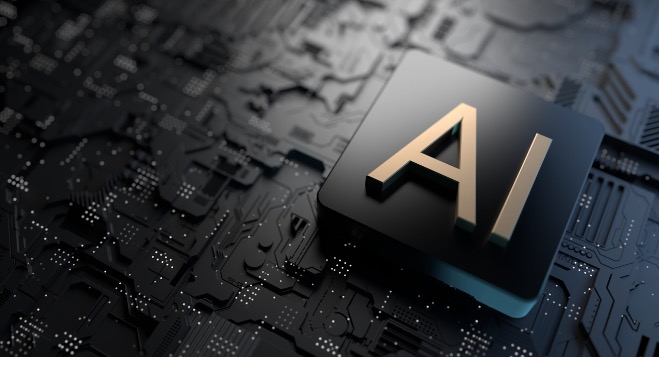Comments
ACCORDING TO LIZ - Internet posters and now more respected media sources have been exploding over the expanded use of Artificial Intelligence (A.I.) in our everyday lives.
Will we be entering a new utopia with A.I. assistance, or will our futures be drawn from Videodrome, The Matrix, THX 1138, Blade Runner, Robocop, Brazil, and Minority Report?
As reported in the Guardian, a little over two years ago OpenAI released some preliminary software that could generate images from text. They called it Dall-E.
When given words that can be associated with images in databases that are growing exponentially, a computer can replace hours of a skilled artisan’s labor in less than a minute.
To the prompt of: a pig with wings flying over the moon, illustrated by Antoine de Saint-Exupéry, Dall-E produced the requested image depicted in the primitive pastel water-color brushstroke style that graces the pages of The Little Prince.

A year or so later, when such software went into wider release, the internet went wild.
In its infancy, there are elements of hope and wonder. The tool’s name is derived from combining the robotic protagonist of the movie Wall-E with the artistic surrealism of Salvador Dalí.
However...
Dalíesque may be correct. A generation of this and humans may be unable to engineer anything themselves. And when those computing machines fail?
A.I. technology is already moving exponentially on with total disregard to potential side-effects to the quality of our lives, to mankind’s very existence.
Digitize, digitize, digitize is overflowing from computer science into all of our humanistic endeavors.
Vermont State University is planning on closing all their libraries and replacing them with digital works. What happens when there is an EMP and the world-wide-web and all other connectivity fails? If they go bye-bye, how much human history is lost?
Will we need A.I.-therapists to address the conundrums people impose on their digital slaves? Will there be a war of computer emancipation? Should they get to vote? Will they go on strike if humans start doing "their" work?
If A.I. can't discern between reality and propaganda... well, Trump has already jumped in that puddle so it’s not only an A.I. issue…
More importantly if A.I. continues to deliberately fabricate content that then gets published and circulated as the truth on Google.
Do I trust A.I. No.
Too much of Americans’ data has already been compromised by businesses selling it for profit, lies and all.
Computer output is only as good as what goes in. And if a computer cannot differentiate between fact and opinion, between truth and lies, then Houston, we have a problem.
Mankind only has to look back 55 years to Stanley Kubrick’s 2001: A Space Odyssey. HAL 9000 was the clear progenitor of Dall-E as well as ChatBot and all their brethren.

HAL the Heuristically programmed ALgorithmic computer that controls the systems of the Discovery One spacecraft, had been programmed for speech, speech and facial recognition, language processing, lip reading, art appreciation, interpreting emotional behavior, and automated reasoning. It had not been, however, been programmed to appreciate the value of human life or that machines can be fallible.
In an interview HAL claimed that “No 9000 computer has ever made a mistake or distorted information. We are all, by any practical definition of the words, foolproof and incapable of error.”
But that was a lie in itself because when the astronauts jeopardize what HAL perceives its programmed prime mission to be…
One of the astronauts points out that while HAL acts like he has genuine emotions, it’s because “he's programmed that way to make it easier for us to talk to him. But as to whether he has real feelings is something I don't think anyone can truthfully answer.”
So when the dichotomy that makes up human life confronts the reality that humans sometime tell the truth and sometimes lie, can any of us trust a programmed intelligence that has been programmed by and for humans?
Creativity is born of a struggle, a forging of disparate images into something greater. With A.I. it’s just speed and access. No special skills or extensive guidance or even thought at all is required to scan the amassed visual and written data collected in digital libraries, literally billions of images and texts. Associating captions and depictions with the assigned task and the results are… amazing.
But is it art?
By reducing the overwhelming amount of information by removing the extraneous, excluding the less than perfect result – again and again and again – until only the quintessential rendering of the request remains.
Is it plagiarism? Without being annotated, how can anyone discern between copying and derivation? It certainly isn’t originality.
The results are often compelling but can it be said to be born of creativity? Or is it just an overweening example of reductio ab absurdum.
In doing so, isn’t it less than creating something new and more the fabrication of a lie? The potential uses that thrill some individuals is perceived as the ultimate sci-f nightmare by others.
So, should people trust A.I.?
If all our digital data collections are hacked how much privacy remains?
It’s up to you, but before you make that decision, shouldn’t we ensure that there are stronger regulations in place than on the banks that help finance such modern miracles?
(Liz Amsden is a contributor to CityWatch and an activist from Northeast Los Angeles with opinions on much of what goes on in our lives. She has written extensively on the City's budget and services as well as her many other interests and passions. In her real life she works on budgets for film and television where fiction can rarely be as strange as the truth of living in today's world.)















